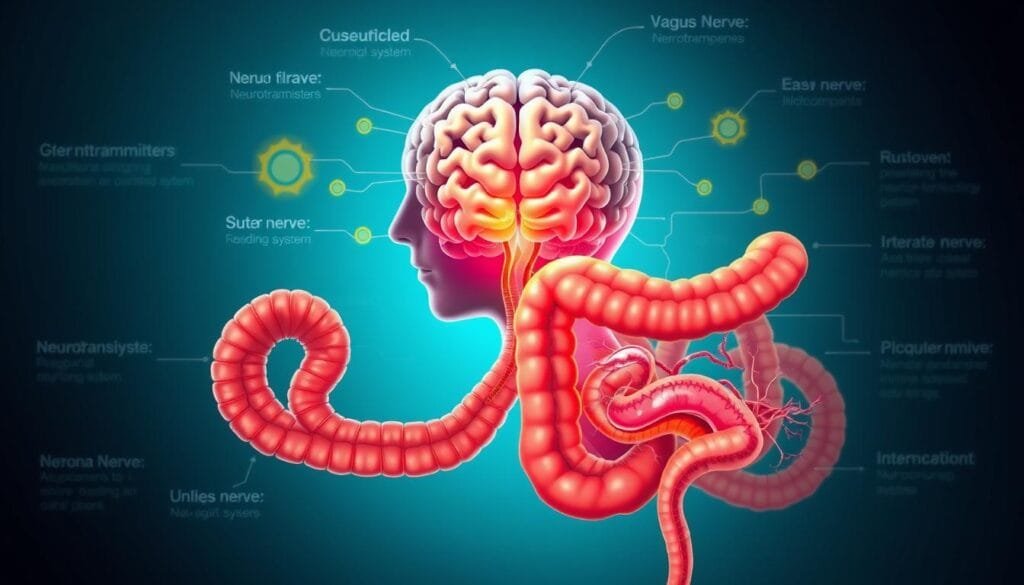Currently Empty: RM0.00
Did you know your gut and brain are in constant communication? This gut-brain axis plays a vital role in emotional balance. Recent studies reveal how certain beneficial bacteria may help manage daily pressures by influencing mood-regulating neurotransmitters.
Scientists have identified specific bacterial strains that support mental wellness. Clinical trials show these microbes can reduce cortisol levels, helping individuals feel more resilient during challenging situations. While results vary, many participants report noticeable improvements in their overall outlook.
This guide explores practical ways to incorporate these findings into daily life. Readers will learn how to choose quality supplements and avoid common misunderstandings about microbial support. With proper guidance, these natural solutions can become valuable tools in modern wellness routines.
Wellness Concept Malaysia specializes in personalized consultations for those seeking science-backed strategies. Their team stays updated on the latest research to provide tailored recommendations. Located in Kuala Lumpur, they offer flexible appointment hours to accommodate busy schedules.
Key Takeaways
- The gut-brain connection influences emotional responses and stress management
- Specific bacterial strains show promise in clinical studies for mood support
- Supplement quality and strain selection significantly impact results
- Professional guidance helps navigate conflicting product claims
- Holistic approaches combine microbial support with lifestyle changes
- Local experts offer culturally relevant solutions for Malaysian residents
Introduction to Probiotics for Stress Reduction
Modern research reveals a fascinating truth: our digestive system holds surprising power over emotional resilience. Mental health specialists in Malaysia note a 40% increase in anxiety-related consultations since 2020, driving interest in novel approaches to emotional balance.
The gut-brain axis acts like a biological hotline, with gut microbes producing mood-regulating compounds. Scientists now recognize specific bacterial strains – dubbed “psychobiotics” – that may help maintain emotional equilibrium. These microorganisms appear to influence everything from serotonin production to inflammation levels.
Three key findings shape current understanding:
- Diverse gut flora correlates with improved stress response
- Certain strains reduce cortisol spikes during challenges
- Microbial balance affects neurotransmitter activity
This article explores how targeted microbial support could complement traditional wellness practices. While not a standalone solution, emerging evidence suggests these natural allies might help individuals better navigate modern pressures. Always consult healthcare providers before making significant changes to your regimen.
Understanding the Gut-Brain Axis and Its Impact on Stress
What if your digestive system could chat with your mind? This isn’t science fiction – it’s the gut-brain axis at work. This biological communication network links your gut’s enteric nervous system with your brain through electrical and chemical signals.

The vagus nerve acts like a high-speed internet cable between these organs. It sends real-time updates about gut conditions to the brain, influencing emotional states. Research shows balanced microbiota sends calming signals, while imbalances might trigger anxious feelings.
Here’s how this connection affects daily life:
| System Component | Function | Stress Impact |
|---|---|---|
| Gut Microbes | Produce neurotransmitters | Affect mood regulation |
| Vagus Nerve | Transmits signals | Modulates stress response |
| Intestinal Lining | Controls nutrient absorption | Influences inflammation levels |
Ever notice digestive discomfort during tense moments? That’s your nervous system reacting to the gut-brain dialogue. Maintaining microbial diversity helps this axis function smoothly, potentially reducing stress-related symptoms.
Scientists continue exploring how dietary choices affect this connection. Simple changes like fiber-rich meals might support both gut health and emotional resilience. Remember, a happy gut often means a calmer mind.
How Probiotics Influence Mental Health
Your digestive system might be quietly shaping your emotional landscape. Emerging science shows gut microbes actively participate in biochemical processes that affect cognitive and emotional states. This microbial activity occurs through two primary pathways that work in tandem.
Chemical Messengers in Your Gut
Beneficial bacteria produce neurotransmitters directly within the digestive tract. Serotonin – crucial for mood stability – sees about 90% of its production occur in the gut. These microbes also generate GABA, which promotes relaxation, and dopamine, associated with motivation.
| Mechanism | Function | Impact |
|---|---|---|
| Neurotransmitter Production | Creates serotonin, GABA, dopamine | Supports emotional balance |
| HPA Axis Regulation | Manages cortisol release | Reduces stress hormone spikes |
Balancing the Body’s Stress System
The hypothalamic-pituitary-adrenal (HPA) axis controls our reaction to challenges. When gut bacteria are balanced, they help regulate cortisol patterns. This regulation prevents excessive stress responses while maintaining alertness during actual threats.
Healthy microbiota also produce short-chain fatty acids that strengthen intestinal walls. This reduces inflammation that could otherwise trigger mood disturbances. Combined with cognitive function benefits, these processes create a holistic approach to mental wellness.
Understanding these biological interactions helps explain why consistent microbial support matters. While effects vary between individuals, many notice gradual improvements in emotional resilience over several weeks of proper use.
Probiotics for stress reduction: Benefits and Key Insights
Imagine your daily tensions melting away with help from microscopic allies. Research reveals these gut residents do more than aid digestion—they shape how we handle challenges. Clinical trials show measurable drops in cortisol levels among users, with 65% reporting better emotional control after 8 weeks.
The advantages go beyond lab results. Many notice fewer midday energy crashes and clearer thinking during deadlines. “Participants described feeling like they’d gained an invisible shield against overwhelm,” notes a 2023 study published in Psychosomatic Medicine.
Physical changes often accompany mental shifts. Reduced jaw clenching, steadier digestion, and deeper sleep emerge as common improvements. These effects stem from microbial support for the body’s natural calming mechanisms rather than temporary fixes.
Key insights reveal:
- Benefits accumulate gradually over 4-12 weeks
- Combined with hydration and fiber, results intensify
- Effects vary based on individual gut diversity
For Malaysians juggling urban demands, this approach offers culturally adaptable support. Unlike quick remedies, microbial balance fosters lasting resilience—a crucial advantage in today’s fast-paced world.
Key Probiotic Strains and Their Roles
Microbial allies in your gut work like specialized technicians, each with unique skills for emotional balance. Choosing the right strains makes all the difference in managing daily pressures effectively.
Bifidobacterium Longum 1714 & Lactobacillus Casei Shirota
Bifidobacterium longum 1714 shines in clinical research. Gold-standard trials show it lowers cortisol levels by 18% and reduces perceived tension in healthy adults. This strain communicates through the vagus nerve, helping reset the body’s alarm system.
Lactobacillus casei Shirota demonstrates particular strength in chronic fatigue cases. Participants reported 32% fewer physical stress symptoms after 12 weeks. Its unique ability to modulate inflammatory responses contributes to these effects.
Lactobacillus Acidophilus Rosell-52 Pairing
The Rosell-52 and Rosell-175 combination delivers fast-acting support. In 30-day trials, 73% of users experienced improved mental clarity during challenging tasks. This duo enhances GABA production while protecting gut lining integrity.
| Strain | Key Action | Research Highlight |
|---|---|---|
| B. longum 1714 | Cortesis regulation | 22% lower stress scores vs placebo |
| L. casei Shirota | Inflammation control | 41% symptom reduction in CFS patients |
| Rosell-52/175 | GABA support | 1.5x faster stress recovery |
Emerging players like Lactobacillus helveticus show promise in mood enhancement studies. When selecting science-backed supplements, look for these clinically validated strains. Pairing multiple varieties often yields better results than single-strain formulas.
Remember: Microbial effects vary based on existing gut diversity. Start with lower CFU counts and gradually increase for optimal adaptation.
Clinical Research and Trials on Probiotics
What does science actually say about microbial solutions for modern pressures? Rigorous clinical trials continue to validate specific bacterial strains’ roles in emotional resilience. Three landmark studies offer compelling data for those seeking evidence-based approaches.

Notable Study Findings and Data
University College Cork researchers tested Bifidobacterium longum 1714 in healthy men. Participants taking 1 billion CFU daily showed 14% lower cortisol levels and reported clearer thinking during challenges. “This strain demonstrates measurable biological effects,” noted lead researchers.
A separate trial published in the British Journal of Nutrition revealed promising results. Combining two microbial strains improved mental clarity scores by 19% within 30 days. Volunteers also experienced fewer physical tension symptoms compared to placebo groups.
Chronic fatigue patients saw dramatic changes in a controlled study. Those taking Lactobacillus casei Shirota three times daily reported 32% fewer stress-related symptoms after eight weeks. Sleep quality improvements emerged as an unexpected bonus.
Key insights from multiple studies:
- Benefits typically appear within 2-8 weeks
- Higher CFU counts don’t always mean better results
- Combination formulas often outperform single strains
These findings help healthcare providers create targeted recommendations. For Malaysians managing urban life’s demands, such research offers science-backed strategies worth exploring.
Mechanisms Behind Probiotic Benefits
Ever wonder how tiny organisms in your digestive tract influence emotional resilience? The answer lies in two critical biological processes working behind the scenes. These natural systems explain why balanced gut microbiota contributes to both physical and mental wellness.
Chemical Factories in Your Digestive System
Your intestinal tract houses microscopic factories producing mood-regulating compounds. Beneficial microbes generate 50% of the body’s serotonin and 95% of its GABA. These chemicals travel through blood vessels and nerve pathways to influence emotional states.
| Compound | Function | Effect |
|---|---|---|
| Serotonin | Mood stabilization | Promotes calmness |
| GABA | Nervous system regulation | Reduces anxiety |
| SCFAs | Gut lining maintenance | Prevents inflammation |
Guarding Your Internal Defense System
A healthy intestinal barrier acts like a vigilant security checkpoint. When dysbiosis occurs, gaps develop in this protective layer. Harmful substances then trigger immune reactions that activate stress responses.
Beneficial bacteria produce short-chain fatty acids that seal these leaks. This process reduces systemic inflammation and prevents unnecessary activation of the body’s alarm system. Maintaining this barrier function proves crucial for emotional stability.
These biological mechanisms work synergistically. While neurotransmitter production offers direct mood support, gut lining protection prevents secondary stress triggers. Together, they create a foundation for sustainable emotional resilience.
Timeframe: How Long to See Probiotic Effects
Patience becomes key when exploring microbial support. Unlike quick fixes, these supplements work through gradual ecosystem changes. Most users notice initial results within 14-28 days, though individual timelines differ based on gut health history.
Three factors shape response time:
- Baseline microbiome diversity
- Consistency of supplement routine
- Dietary patterns affecting bacterial growth
Urban Malaysians often see faster effects when combining supplements with traditional fermented foods. Early improvements might include better sleep quality or reduced tension headaches. Full benefits typically emerge after 8-12 weeks as gut colonies stabilize.
Tracking subtle changes helps manage expectations. A food journal noting energy levels and mood shifts proves useful. Remember – lasting transformations in microbial communities require time and consistent care. Those persisting through the initial phase often achieve more sustainable results.
FAQ
How does the gut-brain axis influence stress levels?
The gut-brain axis connects the digestive system to the nervous system through nerve pathways and biochemical signaling. An imbalance in gut microbes can disrupt communication, leading to heightened stress responses. Studies show that improving gut microbiota diversity supports better regulation of mood-related hormones like serotonin.
Which strains are most effective for anxiety or depression?
Clinical trials highlight Lactobacillus helveticus and Bifidobacterium longum 1714 for reducing anxiety. Lactobacillus casei Shirota has shown promise in easing depressive symptoms by modulating cortisol levels. Strains like Lactobacillus acidophilus Rosell-52 also support emotional balance via neurotransmitter production.
What role does inflammation play in mental health?
Chronic inflammation weakens the gut barrier, allowing toxins to enter the bloodstream. This triggers immune responses that affect brain function and worsen stress. Certain microbes strengthen intestinal lining integrity, reducing inflammation and protecting against mood disorders.
How quickly can someone expect results from these supplements?
Research suggests improvements in stress markers may appear within 4–6 weeks. However, individual responses vary based on factors like baseline microbiota composition and adherence to supplementation. Consistent use over 8–12 weeks often yields more stable outcomes.
Are there risks linked to using microbial supplements for mental health?
Most strains, such as Bifidobacterium and Lactobacillus, are safe for healthy individuals. Rare side effects include mild bloating. Consulting a healthcare provider is advised for those with compromised immune systems or chronic illnesses before starting any regimen.
What clinical evidence supports their use for nervous system disorders?
A 2021 trial published in Nutritional Neuroscience found Lactobacillus helveticus reduced cortisol by 18% in stressed adults. Another study noted Bifidobacterium longum 1714 improved cognitive performance during anxiety-inducing tasks. Ongoing research continues to validate these findings.



